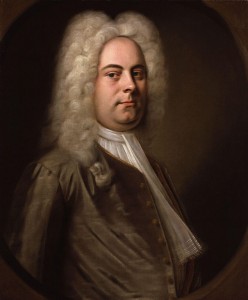 Historical notes written for the Praeclara Messiah by Candlelight program, December 2014
Historical notes written for the Praeclara Messiah by Candlelight program, December 2014
by Thomas E. Kaiser, Professor of History
University of Arkansas at Little Rock
Like many great musical compositions, Handel’s Messiah is wrapped in legends. One is that Handel wrote it while imprisoned for debt in the Tower of London. Another is that when angered at rehearsals, usually by the singers, Handel swore in several languages. But the best known tale is that King George II, when he heard the “Hallelujah Chorus” during the first London performance, rose to his feet in acknowledgment of its greatness, a gesture that audiences have imitated down to the present day. Alas, there is no proof of the king’s attendance at this performance. Nor can it be determined that if George II was there and did stand during the “Hallelujah Chorus,” it was due to his respect for the music, or to his late arrival, or to the need to stretch his legs or relieve his gout, or because he was awakened out of a deep sleep by
its thundering opening chords.
What we do know for certain is that Handel wrote Messiah in 1741 under especially trying circumstances. If not in prison, he had amassed large debts and had been partially paralyzed by a stroke. Although Handel was one of the most famous musicians in Europe, his career as a composer was on the skids. Italian-style opera, on which he had built much of his reputation, had gone out of fashion in England, and none of the oratorios he had written to salvage his career had met with much success.
In that light, Mes siah seems a kind of miracle. Incredibly, the stroke-stricken Handel managed to compose the original version in less than a month. Unlike his first oratorios that had bombed, Messiah in its first Dublin performances was so successful and profitable that it not only kept Handel out of debtor’s prison but also sufficed to cover the debts of one hundred forty-two inmates who were thereupon liberated.
siah seems a kind of miracle. Incredibly, the stroke-stricken Handel managed to compose the original version in less than a month. Unlike his first oratorios that had bombed, Messiah in its first Dublin performances was so successful and profitable that it not only kept Handel out of debtor’s prison but also sufficed to cover the debts of one hundred forty-two inmates who were thereupon liberated.
As far as posterity is concerned, the greatest miracle of all, of course, is the magnificent music itself. Even if King George II never did, in fact, get up from his chair to salute the “Hallelujah Chorus,” Messiah has enthralled us, moved us, and caused us to rise and applaud year after year for more than two-and-a-half centuries.
Photo credit: Portrait of G.F. Handel, attributed to Balthasar Denner [Public domain], via Wikimedia Commons


